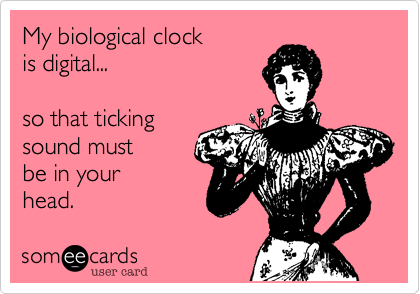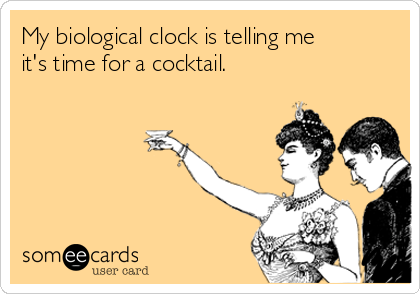This is Your biological clock….Not Ticking
Tick-tock! Who’s there? It’s your biological clo…
It is quite funny that an article on clocks, biological or otherwise, should be written by someone who has never been on time for anything. It’s not that I’ve not completed stuff, it’s just that I have a penchant for not doing them according to a schedule mandated for a valuable and contributing member of a western society.
Once upon a time, when I was still aspiring to become such a valuable and contributing member, an article which I now cannot locate told me that most of the American society had a firm schedule in mind when it came to being considered an adult: graduate from college at 21. Go straight into full-time employment and open a pension fund. Get engaged at 23 and make a downpayment for a house. Get married at 24. Procreate within a year.
I know, I know. What is full-time employment?

But that damned clock is still everywhere.
For years, my cohort felt inadequate: broke and broken up college grads, we were the demographics for whom the term quarter-life crisis was coined. One by one, we became older than our parents were when we were born. It wasn’t something we talked about (such a first-world problem), but the feeling was real: the feeling of a life that was over before it had the chance to take off. We failed because by the grand old age of 25 we managed, well, not very much. (OK, nothing.)
And yet, we got off lightly: cool kids these days are called emerging adults, which sounds too scary to even contemplate. If you were a quarter-lifer, at least you knew the crisis would be over once you reach the next prescribed milestone, and it was. But what do you do when you’re considered “emerging”? How do you navigate that?
But, you will say, this is not a biological clock – it’s social blueprint, not a scientific fact. That’s the whole point: aging and confusion are real, unfortunately, but the rest is just a convention. And conventions change: until recently, teenagers weren’t an entity and unmarried menstruating women were few and far between. It’s no coincidence, that in religious sense rites of passage come around the age of thirteen.
And a biological clock isn’t exactly a clock, either – despite the fact that some intrepid scientists discovered that an actual ticking clock serves as a powerful reminder to women that their reproductive abilities are on the way out.

(Which kind of makes me want to investigate whether it is the absence of analog devices rather than the ubiquity of wi-fi and electromagnetic radiation that is allegedly rendering us infertile. Kind of.)
Don’t call it the biological clock, call it a circadian rhythm and see how your perception of it changes: it’s suddenly just a cycle that controls our sleep, our productivity, even the Seasonal Affective Disorder.
Feel the pressure ease, too: circadian rhythm is inclusive. Unlike “biological clock”, it’s not just about women who haven’t yet conceived a child. Because as we all know, the “biological clock” talk almost never addresses panicked males in precarious forms of employment who have no idea how to provide for the said child. Almost like we’re not in this together or something. Actually, don’t click on these last two links, they’re scary. It’s kind of surreal. Circadian rhythm is also gentler sounding than the clock, it’s circular, whereas the striking of the dreaded clock comes across as linear and finite.
Sure, we get older, and it’s a sad truth that our bodies may not be capable of doing what they once could, but as long as you are ok with that, there’s no reason to stick to an outdated schedule that would have you with an advanced degree, a good job, reproduced (several times over) and living behind that quaint white picket fence by the age of thirty-four.
Make your own schedule and change it often.

As for the mofos who simply cannot stop warning you that the clock is ticking, remind them of this: “It was a bright cold day in April, and the clocks were striking thirteen.”
If they don’t get it, they don’t get it. Not your fault. You’re still smarter.








